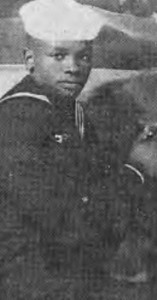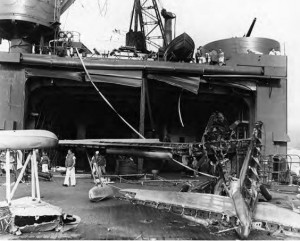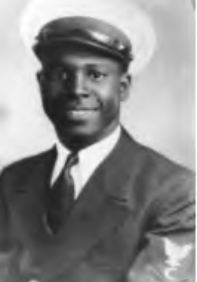Part II of a four-part series
Several sources claim that Doris “Dorie” Miller was the first war hero. Irvin H. Lee wrote that he was responsible for this country’s only victory. To say Miller was the only hero belittles the other men and women who gave their all on that day.

William Jeremiah Powell
Richard E. Miller, a retired chief hospital corpsman who served in the U.S. Navy for 20 years, wrote, “Despite racial discrimination and second-class status within the enlisted corps, the U.S. Navy’s mess attendants, officer’s cooks, and stewards compiled a proud legacy of combat service in World War II. The heroism of a few like “Dorie” Miller became well known to the American public, but most have long been forgotten.”
Richard E. Miller’s book, “The Messmen Chronicle: African Americans in the U.S. Navy 1932-1943” tells the story of those thousands of unheralded sailors of African descent who served in frontline combat with fellow messmen of Filipino, Guamanian, and Chinese ancestry from the first day of war to the last.
To further illustrate the anonymity of non-white military men, it wasn’t until December, 1996, in a letter by Rev. Joe Morgan, Pearl Harbor survivor, that Mess Attendant 3rd class, William Jeremiah Powell was identified as having been the “colored messman” responsible for having shot down the first kamikaze plane on Dec. 7, 1941.
“I was an auxiliary ordinance man on Ford Island at the time of the attack. I could see the Curtiss across the channel from us,” Rev. Morgan said. “The planes were coming at us from across the Island after hitting the Oklahoma. Man, was I scared. Our group shot at this plane and causing it to burst into flames. We thought it was going to hit the water. Instead he aimed the burning plane right for the Curtiss a Seaplane tender, moored offshore.”
Morgan went on to say, “The Curtiss had spotted the conning tower of a submarine and put a shell through the conning tower, and the submarine replied by firing two torpedoes. One just missed the Curtiss, and the other sped by the Monagham and exploded on the Shore of Ford Island.”
“When the gun operator on the crane deck spotted the burning plane headed for them they ran . . . a Black Messman grabbed the deserted gun, making eye contact with the pilot and began to fire directly at the plane, bringing it down. The plane plunged into the deck, starting a fire. Of course he and the pilot died. The ship did not sink.”

“On my first liberty after the Pearl Harbor bombing, aboard a liberty boat, on my way to town. Two (white) sailors who were aboard the Curtiss told me this story. “It has taken me until now (1996) to learn of his name. I don’t suppose that he got any medals or recognition for giving his life that day,” said Rev. Morgan. “He was the only Black messman killed on the Curtiss on December 7th.”
Historical accounts of that day record “USS Curtiss is credited with having shot down three planes, one of which crashed into the ship’s hangar deck. A bomb exploded inside the ship’s hangar killing 20 men and wounding 58.” There was no mention of the man’s name.
Well, I really didn’t understand the depths of the segregation that went on in the navy… when I first went in. In training there were World War I stewards and cooks who were our instructors…and they instructed us as to what our duties would be once we got aboard ship or in the station…and they instructed us (as to) what it would be to work with officers-or work for officers – rather than with them. And it was a very intimate situation between the officers and the steward mates of the mess attendants at that time, because you took care of all of their personal needs: their shoes, their bedding, and their laundry. You made sure of their food and, and all of those things. And you knew everything there was to know after a while…
there was only one branch…open to you, and that was serving the officers. You…started off as a mess attendant, and if you were fortunate, you worked up to be a steward, or a cook, officers’ steward or officers’ cook…
Well, we went through the training and…they outlined that our job was essential, because if the officers were happy, then the rest of the crew were happy. So…it was just a job…and as odd as it may seem, it was a lot of white sailors who would have loved to have been able to…serve in that capacity.
I had been aboard the Utah a little better than 2 years. (The weekend of December 7)… we had just finished the 6-week cycle. We came in early afternoon on Friday, and we went into what we call Fox 11, which is on the west side of Ford Island. The Lexington, the carrier Lexington, had moved out that morning and we moved into the berth where they were originally. So apparently when the reconnaissance plane for the Japanese had taken that picture that Saturday, they had penned in carriers…on the west side of Ford Island, which was the Lexington.
So…that Friday, I had gone out from the ship, tied up…gone to the beach to Honolulu, did some shopping for the officers, shopping for myself, came back; and Saturday morning I did the same thing and then came back and then went back on the beach for that Saturday evening. We had what we called Cinderella Liberty, which meant that we had to be aboard ship by midnight. So I came in about 11:30…and went to sleep.

Clark J. Simmons
That morning…a Black man who was on duty came down…and said that something was happening and we were under attack. And he thought the ship in front of us had blown up. But what really had happened was the Japanese had made a run on us, and the first torpedo that they had sent into the Utah had gone through the bulkhead and ran up onto the beach.
And we got to the rail of the ship…And as we did that, the lines were beginning to part because the ship was listing to the port that by then was 40-45 degree list. She was turning over, and as we got to this walkway and went to the railing, the lines were beginning to part and snap back into the ship. And we just went over the side into the water and (swam) for Ford Island, where the rest of our crew who had gotten off …from other parts of the ship were at that time.
…it’s just as vivid in my mind today as it was that day…I was hit either in the water or as I got on the beach. I don’t know whether its shrapnel or a gun wound. I was hit in the head, the shoulder and the leg. And one of the corpsmen, which is like a nurse aboard the ship, he noticed I was bleeding and … he began to patch me up a little. And he said, “We better get you to the hospital.” So I went to the 1st aid station on Ford Island and from there they transferred me to the submarine base hospital.
I think my worst moment was when I woke up in the hospital and I listened to the radio and they were saying what had really happened here. That was my first realization as to what impact that day had really meant. I knew that I had been hurt but I didn’t realize, you know, what had happened to the rest of the fleet and the rest of the people. I didn’t realize the ship was completely lost. I saw it turn over…it all hadn’t sank…in until that Wednesday.
Dorie Miller and I were classmates in swimming in Norfolk, Va. And this was a big gentleman. He was a huge man, about 6’2”, 225 – 235 pounds – but the nicest guy that you ever want to meet. And we socialized a lot, even in Honolulu when I’d run across him on the beach and we would still…talk…
Dorie Miller was a mess attendant and he went to the West Virginia, and he left Norfolk before I did. I stayed back in Norfolk for a while, and he came out and was assigned to West Virginia.
wanted to put the battleships out of commission. And when the West Virginia was hit, the captain and the…executive officer…were on the bridge….Dorie Miller went up and physically picked up the captain and brought him down to a first aid station, and then he went back and manned a 50-caliber machine gun which he had not been trained on…
This was a very courageous young man, and it’s always believed that he should have gotten the Congressional Medal of Honor, although he got the Navy Cross….
He exemplified a hero…in what he did that day. Dorie Miller got the Navy Cross, and he was the first Black during World War II to get that… he didn’t the Congressional Medal because he was Black. And… the navy, being what it was at that time, didn’t want to set that kind of a standard.

